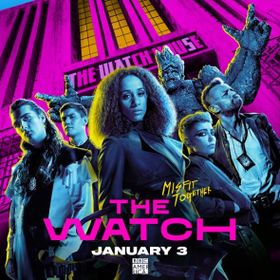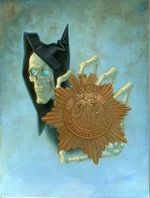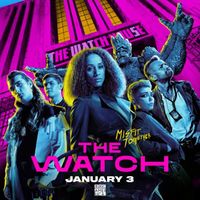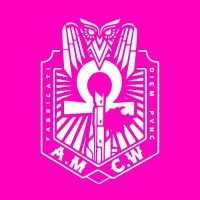TV and Film:The Watch: Difference between revisions
(→Characters: Bit of an update and fleshing out) |
(→Characters: Added comparison of Death character, some more notes on Vetinari) |
||
| Line 87: | Line 87: | ||
* [[John Keel]] was Sam Vimes' mentor in the Watch, and is killed by Carcer after Sam refuses to do it. He passes command of the Watch on to Sam. No time travel of the sort seen in {{NW}} take place. | * [[John Keel]] was Sam Vimes' mentor in the Watch, and is killed by Carcer after Sam refuses to do it. He passes command of the Watch on to Sam. No time travel of the sort seen in {{NW}} take place. | ||
* The [[Librarian]] is an orang utan (or at least an orang utan-like creature), but was not transformed by the Octavo. Instead his new form is a side effect of spending too much time in a magical room in the Library that allows people to read anything. | * The [[Librarian]] is an orang utan (or at least an orang utan-like creature), but was not transformed by the Octavo. Instead his new form is a side effect of spending too much time in a magical room in the Library that allows people to read anything. | ||
* [[Vetinari]] is generally feared, but this version is decidedly less subtle. Her dungeon is a special cell in the | * [[Vetinari]] is generally feared, but this version is decidedly less subtle and sometimes more flamboyant. Her dungeon is a special cell in the Watch House which acts as a safe room in an emergency, rather than as part of a contingency plan to take back control of the city. She uses female pronouns, but prefers to be addressed as “sir”. (Patrician posters in the city show a face with a goatee and “One Man, One Vote”, perhaps suggesting the general population don’t know what she looks like.) | ||
* [[Death]] is openly lonely, has an interest in music (playing his own composition on an instrument he has seemingly devised himself), and a “look I’m just doing my job” attitude closer to that of the Death in the first couple of Discworld novels. He is able to show himself to anyone he wishes (though this doesn’t always seem to be on purpose), even if they are not about to die and have no magical training or special ability to see him, and chats or offers advice when he does so. He has an American accent, unlike any of the denizens of Ankh-Morpork. | |||
Other characters are basically new, sharing a name and little else in common with the books: | Other characters are basically new, sharing a name and little else in common with the books: | ||
Latest revision as of 01:11, 26 April 2023
| The Watch | |
 | |
| ASIN | [1] |
| IMDB | 8080292 |
| First Broadcast | 31st December 2020 |
| Broadcast Channel | AMC+ |
| Director(s) | Craig Viveiros |
| Producer(s) | Rob Wilkins, Hilary Simon, Phil Collinson, Simon Allen |
| Writer(s) | Simon Allen, Amrou Al-Kadhi, Ed Hime, Catherine Tregenna, Joy Wilkinson |
| Starring | Richard Dormer, Marama Corlett, Adam Hugill, Sam Adewunmi |
| Duration | 480 minutes |
| Episodes | 8 |
| Series | Watch Series |
| Annotations | Annotations for TV and Film:The Watch |
| Notes | |
| Preceded by | Good Omens |
| Followed by | The Abominable Snow Baby |
| All data relates to the UK home release. | |
The Watch is an original series inspired by Terry Pratchett's books about the Ankh-Morpork City Watch. Developed by BBC America in conjunction with Narrativia. It has been variously described as a "Pratchett-style CSI," "a punk rock thriller" and "cyberpunk."
Blurb
Set in the fictional city of Ankh-Morpork, where crime has been legalised, The Watch is a uniquely anarchic drama. The series centres on a group of misfit cops as they rise up from decades of helplessness to save their corrupt city from catastrophe. The Watch is an inclusive genre-bending series inspired by the legendary ‘City Watch’ subset of Sir Terry Pratchett’s bestselling “Discworld” novels and its many iconic characters.
Episodes
- A Near Vimes Experience
- Ook
- The What?
- Twilight Canyons
- Not on My Watch
- The Dark in The Dark
- Nowhere in the Multiverse
- Better to Light a Candle
Cast
- Samuel Vimes: Richard Dormer
- Carrot Ironfoundersson: Adam Hugill
- Sybil Ramkin: Lara Rossi
- Carcer Dun: Sam Adewunmi
- Cheery Littlebottom: Jo Eaton-Kent
- Angua von Überwald: Marama Corlett
- Detritus: Ralph Ineson (voice), Craig McRae (body)
- Lord Vetinari: Anna Chancellor
- John Keel: Hakeem Kae-Kazim
- Dr Cruces: Ingrid Oliver
- Archchancellor: James Fleet
- Throat Dibbler: Ruth Madeley
- Wonse: Bianca Simone Mannie
- Inigo Skimmer: Paul Kaye
- Urdo van Pew: Joe Vaz
- Alice Band: Jane de Wet
- The Librarian: Owen McRae (episode 2), Matthew Van Leeve (episode 4)
- Samuel Vimes (Teen): Trevor Frost
- Samuel Vimes (Child): Munro Lennon-Ritchie
- Death: Wendell Pierce (voice), Craig McRae (body)
- Gawain/Wayne: Matt Berry
- Jocasta Wiggs: Fiona Ramsey
- Sergeant Swires: Jonathan Pienaar
- Sybil Ramkin (Teen): Chanté Grainger
- Corporal Cuddy: Thabo Rametsi
- Igor: Riaz Solker
- Goblin #1: Mark Hyland
- Goblin #2: Shane Kruger
- Goblin #3: Shaun Verth
- Goblin #4/Spike: Natalie Walsh
- Skully Multoon: Michael Everson
- Carcer (Child): Joel Iyoka
- Angua (Child): Morgan Santo
- Serafine: Danieyella Rodin
- Sally: Tarryn Wyngaard
Differences Between the Series and Novels
Spoiler Warning
The Watch is an original series "inspired by" the Watch books, rather than being based on any specific Discworld novel. The show therefore differs in numerous ways from the books. Some of these differences are outlined below.
Characters
Many of the main characters depart significantly from the book versions:
- Angua, Detritus and Cheery are all members of the City Watch before Carrot join. Angua is tasked with training him.
- Carcer (using the full name Carcer Dun, which does not appear in the final version of Night Watch) is described in publicity material as “wounded and wronged”. This version is not a psychopath, but a youth whose life on the streets has led him to rebel against the systems that separate rich from poor in Ankh-Morpork. He is still cruel and violent. He is not sent back in time by magical accident, but instead to the realm of the Observers, who transport him forward in time with a mission.
- Vimes and Carcer were best friends in their youth; Carcer's gang saved Vimes from poverty when he was a boy, and they sent young adult Sam to join the Watch to destroy it from within. Sam was meant to kill his commander, but refused, having come to believe in the good of the Watch.
- Cheery is a non-binary person rather than an openly female dwarf. Cheery is also taller than several human characters and remarked by Carrot to be rather tall for a dwarf. In Cheery's home mine all the dwarfs are human sized.
- Sybil Ramkin is younger than in the books, though still a noblewoman. She attempts to improve the city through “chaotic vigilantism”, including kidnapping criminals to re-educate them at the "Sunshine Rescue Centre for Broken, Bedraggled Things." Part of her motivation is that her parents were (legally) killed by the Assassin's Guild; she thus hates the Guild system, and (initially) the Watch, as it is powerless to change it.
- Carrot has a different origin story: he was dropped down a dwarf mine shaft as a baby, seemingly abandoned. He was sent to join the City Watch as it was feared by his parents that his height would put others in danger, as he once knocked his head against a mine shaft support which nearly collapsed the mine. It is suspected later in the series that there might be something special about his parentage, but testing reveals this is not the case.
- Before joining the Watch Detritus lived under a bridge acting as a literal bridge support.
- Throat Dibbler is clearly a criminal, rather than a dodgy entrepreneur. She is sometimes a “snitch” for the Watch, but also has “a gang of freelance henchmen”. She is shown to be dealing in Slab.
- John Keel was Sam Vimes' mentor in the Watch, and is killed by Carcer after Sam refuses to do it. He passes command of the Watch on to Sam. No time travel of the sort seen in Night Watch take place.
- The Librarian is an orang utan (or at least an orang utan-like creature), but was not transformed by the Octavo. Instead his new form is a side effect of spending too much time in a magical room in the Library that allows people to read anything.
- Vetinari is generally feared, but this version is decidedly less subtle and sometimes more flamboyant. Her dungeon is a special cell in the Watch House which acts as a safe room in an emergency, rather than as part of a contingency plan to take back control of the city. She uses female pronouns, but prefers to be addressed as “sir”. (Patrician posters in the city show a face with a goatee and “One Man, One Vote”, perhaps suggesting the general population don’t know what she looks like.)
- Death is openly lonely, has an interest in music (playing his own composition on an instrument he has seemingly devised himself), and a “look I’m just doing my job” attitude closer to that of the Death in the first couple of Discworld novels. He is able to show himself to anyone he wishes (though this doesn’t always seem to be on purpose), even if they are not about to die and have no magical training or special ability to see him, and chats or offers advice when he does so. He has an American accent, unlike any of the denizens of Ankh-Morpork.
Other characters are basically new, sharing a name and little else in common with the books:
- Sergeant Swires is a human officer in the Watch at the time when Vimes joined as a young man.
- Wonse was a part of Carcer's old gang and works as a cleaner at Unseen University, where she has picked up some talent with magic.
- Alice Band is a very young member of the Assassin's Guild who dresses like a schoolgirl.
- Inigo Skimmer is a selfish Assassin who used to do accounts for the Guild. He's not a Dark Clerk, and doesn't work for Vetinari or with Vimes.
- Jocasta Wiggs is an elderly former member of the Assassin's Guild living in Twilight Canyons.
- Sally is a vampire Carrot meets in the Mended Drum. She runs a "virgin support group" which she seems to use to hunt virgins for prey.
Ankh-Morpork
- Members of the Alchemists' Guild operate as drug dealers in a similar way that the Thieves' Guild operates.
- Slab is now a drug taken by humans instead of being exclusively for trolls, it is also used as an important ingredient in magical spells.
- Assassins use a code name in their work e.g. The Slash, Bad Steph, Sex Party Ben. Dr. Cruces and Alice Band seem to be exempt from this rule (perhaps because they are the public face of the Guild?). Assassins are meant to leave no witnesses when carrying out an inhumation, as opposed to not touching non-targets.
- Wizards wear hooded robes instead of pointed hats. They enjoy a high status in the city because they have created the magic-based technology the city relies on.
- The Assassin's Guild has its own cemetery plot where members are buried. Notable assassins are buried under their guild name while disgraced assassins are buried under their real names, with their crimes listed.
- The Unreal Estate is now located outside the city of Ankh-Morpork. It begins in a large desert that surrounds the outskirts of the city and continues towards a lake with corrosive waters. The area is flooded with magical energy that can affect the minds of people who enter.
- There is a cell specifically for the Patrician located in the Watch-house.
Technology
- The technological level of Ankh-Morpork is far more advanced than in the books: the city has light bulbs, telephones, powered musical equipment and clothing with zippers. These advances are down to the Wizards stealing technology from Roundworld and attempting to recreate it with additional magical properties. It's not clear how widespread access to this technology is; dragons were still imprisoned in streelamps to provide light until fairly recently.
- Imps inhabit security cameras and paint on tablets similar to their book counterparts. However the tablets act similar to touchscreen devices with scrolling images and zoom and video functionality.
- The Clacks system is represented as ticker-tape like machines.
Non-Humans
- Goodboy is a pocket-sized dragon resembling a winged Armadillo girdled lizard. He can breath fire from his mouth, and Sybil uses him as a handheld flamethrower.
- Goblins are much taller - a similar size to humans - wear armour, and work as mercenaries. They speak their own language which is not commonly understood by non-goblins.
- There are many new unnamed humanoid species present in the show; these include human-looking people with various types of horns, a blue skinned humanoid wearing gold armour, and a humanoid with large pointed ears and bushy eyebrows.
- It is unclear whether female dwarfs have beards. Carrot's dwarf mother did not have a beard but Cheery mentions that her mother shaved her beard off and later wore a false one.
- The Summoning Dark, also called 'the Dark in the Dark,' is still feared, but is now a benevolent entity. It seeks out outcasts in dwarf society and transports them to a realm where they can be their true selves as well as other versions of themselves. It can also transport people across the world instantly and summon music and costumes.
- Trolls can communicate with other Trolls telepathically via touch. The oldest Trolls can even communicate with each other through different universes.
- The Noble Dragon has a far more ethereal appearance; it seems to be composed of black smoke, with a glowing fiery core.
- The Auditors are replaced with beings called The Observers, who live in their own realm consisting of an endless landscape of enormous filing cabinets.
Gallery
 |
 |
 |